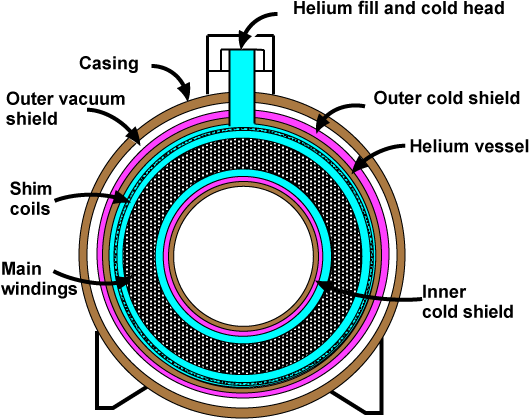There are a number of resources that are essential to modern society, without that fact being broadly known. My favorite is the blood of horseshoe crabs, which is currently irreplaceable as a detection mechanism for the presence of toxins on any medical equipment or medicines that will be entering the human body through the skin. If horseshoe crabs go extinct, modern medicine will take a big hit. Another such resource is helium. I didn’t know how useful it was until college, and my hunch is that a lot of folks remain ignorant about it throughout their lives.
While it has a large number of uses, arguably the most important use of helium is in its liquid form as a super-coolant, keeping the superconductors of MRIs and NMRs at the temperatures required for the work they do. While I put effort into doing as little lab work as possible during my college years (while doing what was necessary for my biology degree), the importance of the NMR in analyzing substances was clear, and it’s hard for me to imagine how much damage the loss of that technology would do. It wouldn’t cause the downfall of civilization, but it would remove a powerful tool in our efforts to diagnose illness, and to understand the universe we inhabit.

MRI diagram
This means that the recent discovery of a large helium deposit is good news, because existing supplies have been dwindling, and raising alarms over what happens if we run out. It’s also good news because currently, a large portion of our helium supply comes from natural gas extraction, which is something that needs to end, for the sake of humanity. The Tanzanian deposit, along with the possibility of other helium deposits means that we might be able to both decouple helium production from fossil fuel extraction, and maintain a supply until we are able to find an alternative technology, or maybe even start getting resources from other planets.
And this is where the danger and the opportunity both come into the conversation. This presents an opportunity for Tanzania, and for the entire continent of Africa, which has taken steps towards an E.U.-style arrangement. Maintaining control over a vital resource would provide such a union with wealth and international influence, both of which could go a long way toward improving conditions across the continent. The danger is the reason that conditions are in such need of improvement. For centuries, nations outside of Africa have been plundering that continent, through the Trans-Atlantic slave trade, 20th century colonialism, and present-day economic practices.
This discovery presents an opportunity not just for Tanzania and the African continent, but also for Europe and the United States. Unfortunately, Africa has little political power, as a continent, which means that the fate of this helium deposit is largely in the hands of the rest of the world. If we follow our historical pattern, control over this vital resource will end up in the hands of a private corporation, and the wealth and other benefits from it will leave Africa, provide the benefits of high-tech modern medicine and research to other nations, while residents of Tanzania continue to struggle to get adequate healthcare.
I greatly fear that we will continue the colonial practice of exploiting Africa for all of its resources, while justifying or ignoring the damage we do in the process, but I do feel that there is an opportunity for a new path here. If we are to build the kind of society I want to see, we’ll have to enter a truly post-colonial, post-white supremacy era, and I fear that that will require Europe and the United States in particular to give up power, for the betterment of humanity. I say “fear”, because I’m not convinced that we CAN give up that power, and so I see this discovery of a new helium supply as both a danger and an opportunity. The danger is that we will not change, and we will continue the era of international exploitation, greed, and theft. The opportunity is that we will recognized the need for change, and those of us who have more power will join forces with those who have less, and work towards a better version of human society.

A very exciting finding indeed. Thank you for the information. I am hopeful that with an overall increased democratisation of the world, cooperation will win over exploitation.
Aren’t you concerned about trolls injecting skepticism at the Sealionilum junction?
PS – talking about the teller-ulam configuration in the context of douchebro pressures is still classified. Fortunately we are sharing these emails on Hillary Clinton’s private server, yes?
I confess myself to be a wee bit confused, Marcus >.>
Abe Drayton@#4: I’m not sure it’s OK to talk about these technologies on an unsecure server.
Helium, when first discovered, was almost useless. It became valuable when it was used in airships, and became strategic when airships were used in the military. (Hydrogen was cheaper, and lifted better, but it was flammable.) After airships faded out (partly because the USA didn’t sell helium to Germany for the Hindenberg, and it caught fire), helium was pretty much useless again.
Due to government inertia, helium was collected and stored as a strategic reserve, even though there was then little use for it. About the time some politicians noticed the expense of keeping it, other people started finding more uses for it. Government inertia meant that “useless” helium was being practically given away, just as its usefulness boomed. The low cost increased research into uses for helium, about the time it started running low.
Which where we are now.
By the way, the leak detectors can’t detect helium chemically, as it doesn’t react. They use light and a spectrograph, instead. (I watched a guy testing pressure vessels, and I knew it couldn’t be chemical, and I didn’t think of light. He had no clue how it worked, and we were both puzzled.)